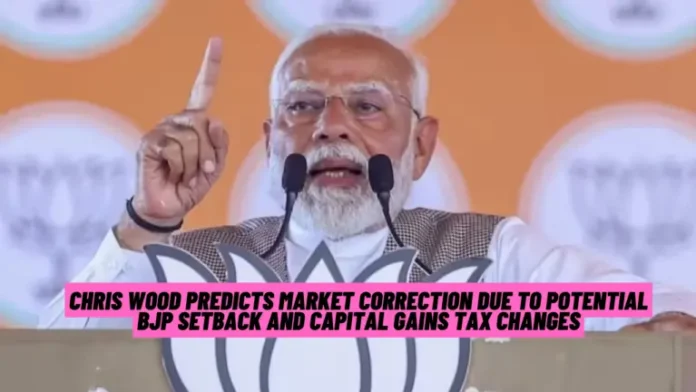Renowned market strategist Chris Wood has forecasted a potential market correction, citing concerns over a possible “surprisingly bad outcome” for the BJP in upcoming elections and anticipated changes to capital gains tax regulations. This prediction has sparked discussions among investors and analysts about the future of the Indian market.
Chris Wood’s Market Prediction
Market Correction Forecast
Chris Wood, known for his insightful market analyses, has predicted that the Indian stock market might face a significant correction. According to Wood, this downturn could be triggered by unexpected political developments and changes in fiscal policy.
Factors Influencing the Prediction
Wood’s forecast is based on two main factors: a potentially poor performance by the BJP in the upcoming elections and possible adjustments to capital gains tax policies. These elements are seen as catalysts that could destabilize market sentiment and lead to a correction.
Political Landscape and Market Reactions
Impact of BJP’s Political Performance
The BJP’s performance in elections has historically influenced market trends. A “surprisingly bad outcome” for the ruling party could create uncertainty and trigger a negative reaction from investors, leading to increased market volatility.
Historical Market Reactions to Political Changes
Historically, the Indian stock market has shown sensitivity to political shifts. Previous election results have led to sharp market movements, reflecting investor sentiment towards political stability and policy continuity.
Potential Capital Gains Tax Changes
Proposed Changes
The government is reportedly considering changes to capital gains tax regulations. While specifics are yet to be announced, such changes could affect investment strategies and market dynamics, particularly if they involve higher taxes on equity gains.
Implications for Investors
Potential changes in capital gains tax could lead investors to reassess their portfolios. Higher taxes might reduce the attractiveness of equity investments, prompting a shift towards other asset classes and possibly causing short-term market disruptions.
Expert Opinions
Analyst Perspectives
Market analysts have mixed views on Wood’s prediction. Some agree that political uncertainty and tax changes could trigger a correction, while others believe the market’s underlying fundamentals remain strong enough to withstand such shocks.
Investor Reactions
Investors are closely monitoring these developments. While some may adopt a cautious approach, adjusting their portfolios in anticipation of potential volatility, others might see any correction as a buying opportunity.
Preparing for Market Volatility
Risk Management Strategies
Investors can prepare for potential market volatility by diversifying their portfolios, maintaining a balanced asset allocation, and considering hedging strategies to mitigate risks associated with political and fiscal uncertainties.
Long-Term Investment Considerations
Despite potential short-term volatility, long-term investors are advised to focus on the fundamentals of the Indian economy, which remains robust. Maintaining a long-term perspective can help weather temporary market disruptions.
Quick Review:
Q: Who is Chris Wood and what is his market prediction?
A: Chris Wood is a renowned market strategist known for his insightful analyses. He has predicted a potential market correction due to an anticipated “surprisingly bad outcome” for the BJP in the upcoming elections and probable changes to capital gains tax regulations.
Q: What specific political event does Chris Wood believe will influence the market?
A: Chris Wood believes that a poor performance by the BJP in the upcoming elections could significantly influence the market, creating uncertainty and potentially triggering a market correction.
Q: How have historical market reactions been influenced by political changes in India?
A: Historically, the Indian stock market has been sensitive to political shifts. Election results that affect political stability and policy continuity have led to sharp market movements, reflecting investor sentiment.

